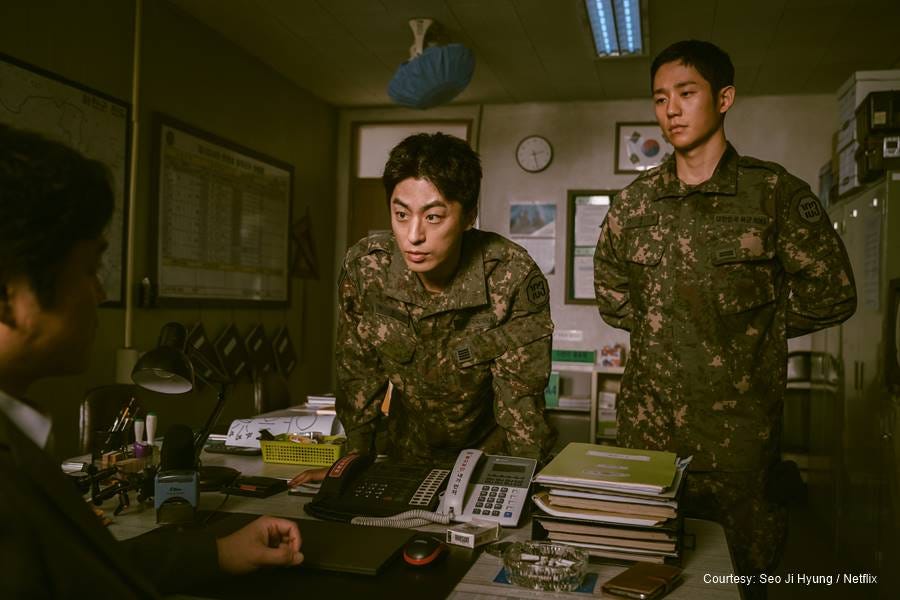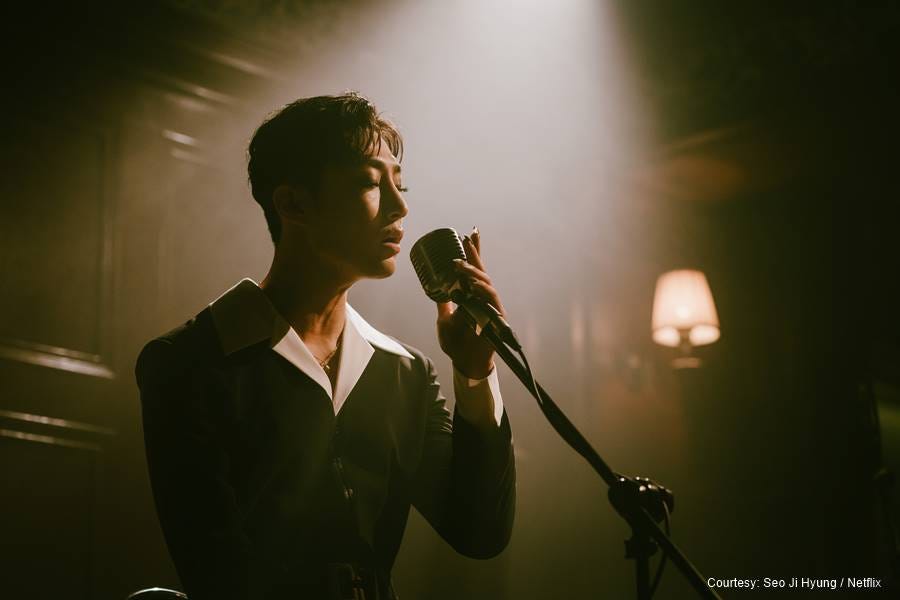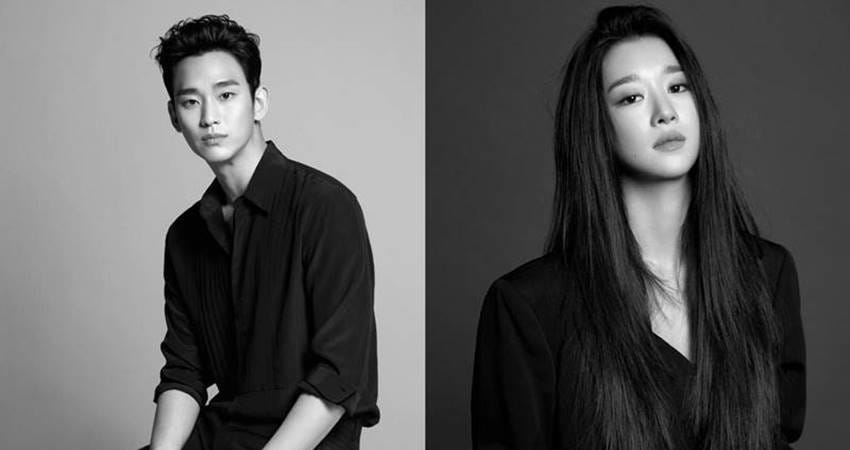2nd Season of "D.P." Confronts Military Desertion
When soldiers are tortured, what right does anyone have to tell them to return to their abusers?
☆☆☆☆
Private Ahn Joon-ho (played by Jung Hae-in)
Corporal Han Ho-yul (played by Koo Kyo-hwan)
↑Note: Korean names denote the surname followed by the given name.
If you haven't yet watched the first season of the superb military K-drama "D.P.," please note that the next paragraph will begin with spoilers from that season.
The second season begins where the first season left off. Our protagonist Joon-ho (Jung Hae-in) has been left reeling from the death of his friend, Suk-bong (Jo Hyun-chul). Sexually, mentally and physically abused by sadistic officers in his troop, Suk-Bong took matters into his own hands. He kidnapped his abuser, before turning the gun on himself.
For Joon-ho and Ho-yul (Koo Kyo-hwan) — who work for the Military Police's Deserter Pursuit unit — this was a life-altering tragedy. Joon-ho is broken, while Ho-yul remains hospitalized and is unable to speak.
Second seasons of shows are challenged with maintaining momentum while adding a fresh element to the series. Many shows suffer from redundancy. But "D.P." does well with a somewhat limited conceit that revolves around Joon-ho and Ho-yul bringing back deserters. But because each episode has an intriguing storyline — and because the show is so well directed, acted and filmed — the series has a cinematic quality that leaves viewers wanting more. Like the first season, "D.P." runs less than six-hours and is highly bingeable.
The main plot revolves around Suk-bong's best friend, Ru-ri (Moon Sang-hoon), who has also been mercilessly bullied (for being fat and unattractive). When he snaps and shoots up his platoon, the carnage is grisly. And yet, you also empathize with him. Yes, he committed a horrific crime. But the military was complicit in his actions.
His superiors don't care about him at all. What they want is a coverup to protect the military's reputation. The tragic act is spun as a mental health issue, rather than the result of systematic abuse. No one does a damned thing about the incessant hazing that causes young men to do the unthinkable.
Kim Sung-hyun and Son Suk-ku return this season as Sergeant First Class Park Beom-gu and Captain Im Ji-sup, respectively. Whereas the two officers were at odds with each other for most of last season, they are of the same mind (mostly) in the new episodes. Their goal is to protect Joon-ho and Ho-yul and make sure the deserters return back to base alive.
The best episode, however, focuses on Private Jang Seung-min (Bae Nara, above), who's gay. As you might imagine, he isn't welcomed by his platoon. He's ostracized and interminably abused. Though they don't depict it, it's implied that he is forced to perform sexual acts on other soldiers. These soldiers don't seem to see anything wrong with being on the receiving end of pleasure from another man, and yet they consider him to be a pervert for being who he is. When he deserts, it's an act of self preservation. He works in a factory during the day and at night as a jazz singer and drag artist and has reinvented himself as Jang Nina.
This is Bae's on-screen acting debut. However, he's an acting veteran who works primarily in musical theater. His portrayal of Nina is one of graceful, nuanced dignity. And I would love to see an entire series that delves into Nina’s complex life.
Another standout episode focuses on the military death of Ji-sup's friend, Jung-seok. The official report said that after Private Shin Ah-wi (Choi Hyun-wook of "Weak Hero Class 1," "Twenty-Five Twenty-One") stepped on a landmine, Jung-seok put his foot on the landmine — allowing Ah-wi to escape — and was blown up in his place. The petulant Ah-wi had apparently bullied his superior and shows no remorse.
This K-drama is based on Kim Bo-Tong's webtoon, "D.P. Dog's Day," which he wrote based on memories of his own military service. That the first season was set in 2014 was no coincidence. That's the year that one soldier was beaten to death by higher ranking officers, while another soldier attacked his abusers, killing five. (More in The Blue Roof.)
Of course, military abuse isn’t relegated solely to South Korea. Last month, Travis King — a U.S. soldier who had served in South Korea — deliberately and illegally crossed the border into North Korea, because he said he was treated inhumanely and suffered from racial discrimination within the U.S. Army.”
On DKDKTV, Danny and David Kim (not related) discussed their own military days in the South Korean army. They said that while they didn't experience the kind of abuse depicted in "D.P.," they didn't flinch at the dramatization, because it was plausible. While discussing sexual harassment on military bases, I found it really telling that Danny at first said it never happened to him. But as they continued to talk, he remembered instances of unwanted touching.
We are so conditioned that harassment isn't really a big deal, unless there are visible signs of physical trauma.
When people try to justify this kind of "bullying" — it'll make them stronger, everyone goes through it — as little more than boys-will-be-boys hazing, what they are essentially doing is justifying institutionalized torture. And this has to stop. As Suk-bong told Ho-yul at the end of last season, "You all knew about it and did nothing."
What both seasons of "D.P." do so well is tell the important and uncomfortable stories that no one wants to believe are true. When soldiers are regularly humiliated, degraded and tortured, what right does anyone have to tell the victims that they must return to their abusers?
Airdates: Six episodes, each between 45- to 55-minutes , were released on Netflix on July 28, 2023. This series is rated TV-MA. The subject matter is intense. It deals with an onslaught of realistic mental and physical abuse. This is not for young children.
Spoiler Alert: Ji-sup learns the truth about his friend Jung-seok. He was not the victim of bullying. He was the bully, making Ah-wi's life miserable. After Jung-seok accidentally died, Ah-wi's temperament changed. He turned into the bully that Jung-seok had been. Perhaps this was his own way of surviving.
Articles You May Be Interested In Reading:
• South Korea’s Criteria for Military Exemption is Outdated (Substack)
• The Rose: Inside the Korean Rock Group’s Biggest Year Yet (Rolling Stone)
• The Jamboree Shitshow (The Blue Roof)
• My Mother’s Cooking Was A Taste Of Korea (Substack)
• The 100 Greatest Songs in the History of Korean Pop Music (Rolling Stone)
© 2023 JAE-HA KIM | All Rights Reserved







D.P. is so hard to watch because of the abuse/trauma depicted, but so well done you can’t help but watch. It was disheartening but not surprising that the incident with Suk-Bong changed absolutely nothing. And despite the trauma all around they’re just expected to continue functioning like nothing happened.
This season was way more into the overt, graphic violence right away than the last season. I wasn't prepared for it to start like that...and it stayed like that throughout. Perhaps I am misrembering the last season. I really, emotionally struggled watching this one. But I feel duty bound to watch the hard stuff and not look away.